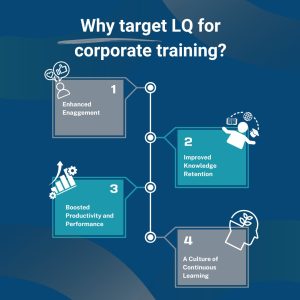Learning Quotient: The Missing Piece in Your Corporate Training Puzzle

Hey there, corporate training gurus! Ever feel like your carefully crafted programs aren’t quite landing the impact you desire? Training budgets burning a hole in your pocket, yet employee engagement remains elusive? Well, fret no more, for the secret sauce you’ve been missing might just be hiding in plain sight: Learning Quotient (LQ).
Think of LQ as the X-factor in your training equation. It’s not just about what you teach, but how your employees learn. It’s the innate ability to absorb, retain, and apply knowledge, the fuel that propels individual and organizational growth. And in today’s dynamic, knowledge-driven world, it’s the differentiator that separates thriving companies from the stagnant ones.
So, why target LQ for corporate training? Let’s unpack the benefits:
1. Enhanced Engagement: Forget the days of droning lectures and glazed-over eyes. By understanding your employees’ LQ, you can tailor training methods to their learning preferences. Interactive workshops, gamified learning platforms, and personalized coaching – these are just a few ways to spark curiosity, ignite passion, and make learning an adventure, not a chore.
2. Improved Knowledge Retention: Ever heard of the “forgetting curve”? It’s the enemy of effective training, causing information to evaporate like a morning mist. But fear not, LQ to the rescue! By focusing on active learning, spaced repetition techniques, and real-world application opportunities, you can transform your employees into knowledge sponges, soaking up information and retaining it for the long haul.
3. Boosted Productivity and Performance: When employees learn effectively, they become confident, capable problem solvers. They can adapt to new situations, embrace change, and tackle challenges with newfound skills and knowledge. This translates to increased productivity, improved performance, and a competitive edge for your organization.
4. A Culture of Continuous Learning: LQ isn’t just about one-off training programs; it’s about fostering a culture of continuous learning. By encouraging employees to embrace their learning styles, seek out new knowledge, and share their learnings with others, you create an environment where growth becomes the norm, not the exception.
Now, how do you target LQ in your corporate training? Here are some practical tips:
- Assess your employees’ LQ: Use readily available tools and assessments to understand individual learning preferences, strengths, and weaknesses.
- Embrace diversity: Cater to different learning styles – visual, auditory, kinesthetic – through varied training methods and materials.
- Make it real-world relevant: Connect training content to actual job tasks and challenges, ensuring immediate applicability and value.
- Provide opportunities for practice: Don’t just preach, let them practice! Simulations, role-playing, and hands-on activities solidify learning and build confidence.
- Celebrate progress and achievements: Recognize and reward employees’ learning efforts, making the journey as rewarding as the destination.

Remember, LQ is not a fixed trait; it can be nurtured and developed. By incorporating these strategies into your training programs, you can unlock the full potential of your workforce, turning them into learning machines, innovation engines, and the driving force behind your company’s success.
So, ditch the one-size-fits-all approach, embrace the power of LQ, and watch your corporate training programs transform from humdrum to high-octane engines of growth and progress.
P.S. Don’t forget to measure the impact! Track employee engagement, knowledge retention, and performance metrics to see the LQ difference in action. And hey, while you’re at it, share your LQ journey with us in the comments below! Let’s build a community of learning enthusiasts and make the world a smarter, more adaptable place, one LQ boost at a time





